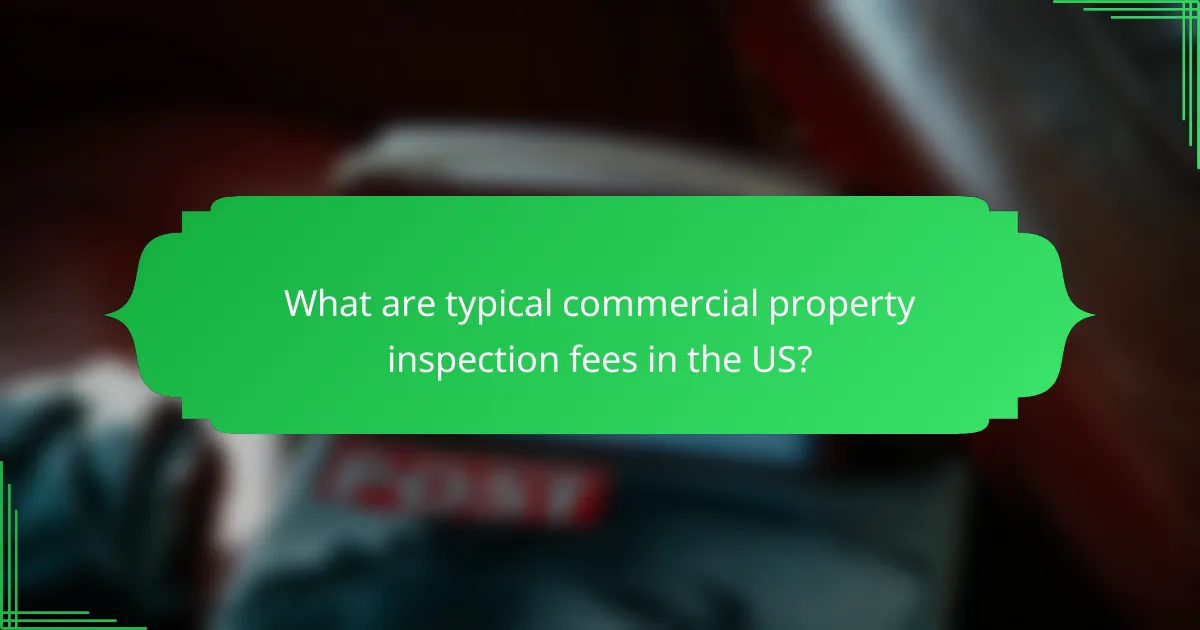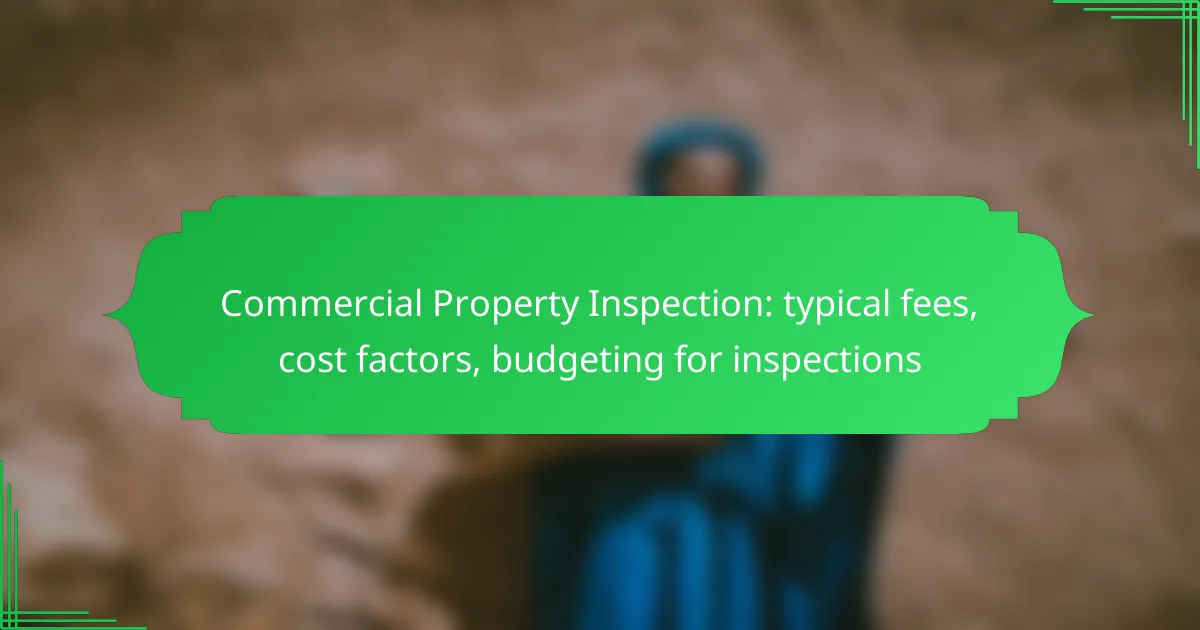Commercial property inspection fees can vary significantly, typically ranging from a few hundred to several thousand dollars based on factors such as property size, location, and inspection complexity. Understanding these cost determinants is essential for property owners to budget effectively and avoid unexpected expenses. By estimating costs and comparing service providers, owners can ensure they allocate adequate resources for thorough inspections, ultimately safeguarding their investments.

What are typical commercial property inspection fees in the US?
Typical commercial property inspection fees in the US range from a few hundred to several thousand dollars, depending on various factors. The cost is influenced by the property’s size, location, and the complexity of the inspection required.
Average inspection costs
The average cost for a commercial property inspection generally falls between $300 and $1,000 for smaller properties. Larger or more complex buildings may incur fees ranging from $1,000 to $3,000 or more, especially if specialized inspections, such as environmental assessments or structural evaluations, are needed.
For example, a standard inspection of a small office building may cost around $500, while a comprehensive inspection of a multi-story retail space could reach $2,500. It’s essential to obtain quotes from multiple inspectors to ensure competitive pricing.
Regional fee variations
Inspection fees can vary significantly across different regions in the US. Urban areas with higher living costs, such as New York City or San Francisco, typically have higher inspection fees compared to rural locations.
For instance, a commercial property inspection in a major city might cost 20-30% more than the same inspection in a less populated area. Understanding local market rates can help in budgeting appropriately for inspections.
Factors influencing pricing
Other factors include the age of the property, the condition of its systems (like HVAC, plumbing, and electrical), and any specific requirements for specialized inspections. Additionally, the inspector’s experience and reputation can also affect the overall cost. Always ensure that the inspector is qualified and familiar with local regulations to avoid potential pitfalls.

What factors affect commercial property inspection costs?
Several factors influence the costs of commercial property inspections, including the size and type of the property, the scope and complexity of the inspection, and local regulations. Understanding these elements can help property owners budget effectively for inspections and avoid unexpected expenses.
Property size and type
The size and type of a commercial property significantly impact inspection costs. Larger properties typically require more time and resources to inspect, leading to higher fees. For instance, a small office space may cost a few hundred dollars to inspect, while a large warehouse could run into the low thousands.
Additionally, specialized properties, such as industrial facilities or multi-tenant buildings, may incur extra costs due to the need for specialized knowledge or equipment. Always consider the specific characteristics of your property when budgeting for an inspection.
Inspection scope and complexity
The scope and complexity of the inspection directly affect the overall cost. A basic inspection may cover essential elements like structural integrity and safety systems, while a comprehensive inspection could include detailed assessments of HVAC systems, electrical wiring, and environmental concerns.
Complex inspections often require more skilled professionals and can take longer to complete, resulting in higher fees. For example, a simple visual inspection might cost around $300, whereas a detailed inspection with extensive reporting could exceed $1,000.
Location-specific regulations
Local regulations can also influence inspection costs, as different areas have varying requirements for commercial properties. Some regions may mandate specific inspections or certifications, which can add to the overall expense.
For instance, properties in urban areas may face stricter compliance standards, necessitating additional inspections or documentation. It’s essential to research local regulations and factor these potential costs into your inspection budget to ensure compliance and avoid fines.

How to budget for commercial property inspections?
Budgeting for commercial property inspections involves estimating costs, setting aside contingency funds, and comparing service providers. Proper planning ensures you allocate sufficient resources for thorough inspections, which can prevent costly surprises later.
Estimating total costs
Total costs for commercial property inspections can vary significantly based on factors such as property size, location, and inspection type. Typically, fees range from a few hundred to several thousand dollars, depending on these variables.
For example, a standard inspection for a small office building might cost around $500 to $1,500, while larger properties or specialized inspections, like environmental assessments, can exceed $3,000. Always request detailed quotes to understand what is included in the fee.
Setting aside contingency funds
Setting aside contingency funds is essential when budgeting for inspections. Aim to reserve about 10-20% of your total inspection budget to cover unexpected issues that may arise during the process.
This buffer can help address additional tests or repairs that might be necessary after the initial inspection findings. For instance, if an inspection reveals potential structural issues, having funds available allows you to act quickly without financial strain.
Comparing inspection service providers
When comparing inspection service providers, consider their experience, reputation, and the range of services offered. Look for companies that specialize in commercial properties and have positive reviews from past clients.
Request quotes from multiple providers to gauge pricing and services. Ensure that each quote includes a breakdown of what is covered, such as structural, electrical, and plumbing assessments. This comparison will help you make an informed decision and ensure you receive value for your investment.

What are the common types of commercial property inspections?
Common types of commercial property inspections include general property inspections, specialized inspections, and environmental assessments. Each type serves a specific purpose and helps identify potential issues that could affect the property’s value and safety.
General property inspections
General property inspections provide an overall assessment of the building’s condition, including structural integrity, roofing, and electrical systems. Inspectors typically evaluate visible components and systems to identify any immediate concerns or necessary repairs.
These inspections usually cost between $300 and $800, depending on the property’s size and location. It’s advisable to schedule a general inspection before finalizing any purchase to avoid unexpected expenses later.
Specialized inspections (e.g., HVAC, plumbing)
Specialized inspections focus on specific systems within the property, such as HVAC, plumbing, or electrical systems. These inspections are crucial for identifying issues that may not be apparent during a general inspection.
Costs for specialized inspections can vary significantly, often ranging from $200 to $1,500 based on the complexity of the system and the inspector’s expertise. Engaging specialists for these inspections can help ensure that all critical systems are functioning properly and comply with local regulations.
Environmental assessments
Environmental assessments evaluate potential environmental hazards associated with a property, such as soil contamination or the presence of hazardous materials. These assessments are essential for properties that may have been used for industrial purposes or located near environmental risks.
The cost of environmental assessments can range from $1,000 to $5,000, depending on the property’s history and the scope of the assessment. Conducting these assessments is crucial for compliance with environmental regulations and for protecting future occupants from health risks.

How do I choose a commercial property inspector?
Choosing a commercial property inspector involves evaluating their qualifications, experience, and client feedback. A qualified inspector should have relevant certifications and a solid track record in inspecting properties similar to yours.
Qualifications and certifications
Look for inspectors who hold certifications from recognized organizations, such as the American Society of Home Inspectors (ASHI) or the International Association of Certified Home Inspectors (InterNACHI). These credentials indicate that the inspector has undergone rigorous training and adheres to industry standards.
Additionally, check if the inspector is licensed in your state or country, as this can vary by location. Licensing often requires passing exams and completing continuing education, ensuring the inspector stays updated on best practices and regulations.
Experience in specific property types
It’s crucial to select an inspector with experience in the type of commercial property you own or are considering. For instance, inspecting an office building differs significantly from evaluating a retail space or industrial facility.
Ask potential inspectors about their past projects and how many similar properties they have inspected. This experience can provide insights into specific issues that may arise in your property type, allowing for a more thorough evaluation.
Client reviews and testimonials
Client feedback is a valuable resource when choosing a commercial property inspector. Look for online reviews on platforms like Google or Yelp, and consider asking for references from the inspector directly.
Pay attention to comments regarding the inspector’s thoroughness, professionalism, and communication skills. A well-reviewed inspector is more likely to provide a comprehensive assessment and address any concerns you may have during the inspection process.

What are emerging trends in commercial property inspections?
Emerging trends in commercial property inspections focus on technology integration, sustainability, and enhanced reporting methods. These trends aim to improve efficiency, accuracy, and transparency in the inspection process.
Technology Integration
Technology is increasingly being utilized in commercial property inspections, with tools such as drones, thermal imaging, and software applications enhancing the inspection process. Drones can access hard-to-reach areas, while thermal imaging helps identify issues like insulation problems or leaks that may not be visible to the naked eye.
Additionally, inspection software allows for real-time data collection and reporting, streamlining communication between inspectors and property owners. This integration not only speeds up inspections but also improves the accuracy of findings.
Sustainability Focus
There is a growing emphasis on sustainability during commercial property inspections, reflecting a broader trend in the real estate market. Inspectors are increasingly evaluating properties for energy efficiency, water conservation, and overall environmental impact.
Property owners are encouraged to adopt green building practices, and inspections now often include assessments of energy-efficient systems and materials. This focus on sustainability can enhance property value and appeal to environmentally conscious tenants.
Enhanced Reporting Methods
Enhanced reporting methods are becoming standard in commercial property inspections, with detailed digital reports replacing traditional paper formats. These reports often include photographs, videos, and interactive elements that provide a clearer understanding of the property’s condition.
Furthermore, many inspection companies are adopting cloud-based platforms for report storage and sharing, allowing for easy access and collaboration among stakeholders. This shift not only improves transparency but also facilitates better decision-making for property management and investment.
